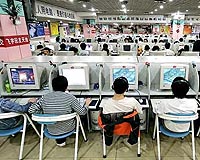| . |  |
. |
Sydney (AFP) May 20, 2010 Australia on Thursday assured China that a controversial mining tax will not drive up commodities prices and held talks with global giant Rio Tinto, in a bid to quell industry fury over the levy. Trade Minister Simon Crean told reporters in Shanghai that the 40 percent Resources Super Profits Tax would raise supply by replacing flat royalty fees, encouraging smaller projects. "It is likely to increase the supply of those exports," Crean said late on Wednesday, according to an official transcript. "It will not increase the price, because it's not a tax on consumption, it's a tax on profits." Crean said prices for materials such as iron ore and coal were being inflated because demand was outstripping supply. The new regime would redress the balance by stimulating output from marginal operators, he said. "From the economic modelling that has been done in relation to this tax, the conclusion is that it will result in a six to seven percent increase in mining investment," the trade minister said. David Peever, Rio's managing director for Australia met Treasury officials in Canberra Thursday to press the company's case against the reforms, a spokesman told AFP. "We've raised our concerns, though we've said we'll respect the consultation and committee process such as it is, and that's what we're doing," the spokesman said. But Andrew Forrest, head of Australia's third-largest iron ore producer Fortescue Metals Group, said consultations had been futile and he was advised nothing in the package would be changed. "They said 'if you want to get rid of this tax, you have to change the government'," said Forrest, who this week put two massive iron ore projects worth a combined 15 billion US dollars on hold. Treasurer Wayne Swan defended the consultation process as "genuine" and said there would be "sections of the industry that will run scare campaigns, that will defend their interests. "My job is to defend the national interest." Crean said he had invited China -- Australia's biggest trading partner and a major investor in its vital resources sector -- to take part in the consultation. But he emphasised that Beijing needed to accept prices were determined by market forces, adding that "if China wants to be recognised as a market economy, it has to act like one". Crean dismissed reports that he had warned Chinese officials against introducing an import tax on Australian iron ore, saying it "did not get raised" during talks with the National Development and Reform Commission. "Introducing new taxes at the border is not conducive to trade or to market economies," Crean said. "In fact, it is also increasing the input costs to the Chinese market." The planned 40 percent super tax has drawn a furious response from companies, with giants BHP Billiton and Rio reviewing their Australian operations and other firms suspending projects. The Minerals Council of Australia (MCA), whose members include BHP, Rio and Brazil's Vale, stepped up its advertising campaign against the reforms Thursday with a fresh series of full-page advertisements in the nation's broadsheet press. Warning that billions of dollars in investment had already been suspended, and the retirement savings of millions of Australians linked to blue-chip mining stocks had plunged, the ads said "everyone" would be hit by the tax. "More projects will be threatened, tens of thousands of jobs put at risk and the wellbeing of communities all over Australia threatened," the MCA warned. Grassroots political movement GetUp! countered with their own adverts, accusing mining chiefs of mounting a "scare campaign" in a bid to protect their own earnings. "These executives make 100 times the average Australian salary," said the newspaper ads, which pictured the heads of BHP, Rio and Xstrata, all strong opponents of the new levy.
Share This Article With Planet Earth
Related Links Global Trade News
 China, Canada among top five on US piracy watch list
China, Canada among top five on US piracy watch listWashington (AFP) May 20, 2010 US legislators have accused Canada, China, Mexico, Russia and Spain of "robbing Americans" by failing to crack down on piracy of movies, music, videogames and other copyrighted works. Theft of intellectual property in the five nations was at "alarming levels," the Congressional International Anti-Piracy Caucus said Wednesday, placing them at the top of the "2010 International Piracy Watch Li ... read more |
|
| The content herein, unless otherwise known to be public domain, are Copyright 1995-2010 - SpaceDaily. AFP and UPI Wire Stories are copyright Agence France-Presse and United Press International. ESA Portal Reports are copyright European Space Agency. All NASA sourced material is public domain. Additional copyrights may apply in whole or part to other bona fide parties. Advertising does not imply endorsement,agreement or approval of any opinions, statements or information provided by SpaceDaily on any Web page published or hosted by SpaceDaily. Privacy Statement |